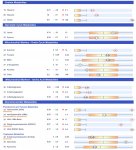godlovesatrier said:
So what does this all mean? What can we take to correct the issue?
Well, ain't that the million dollar question! As I describe in this thread introduction, ME research has good evidence to suggest glycolytic impairment.
I'm proposing enzyme PKM2 is implicated here, it always is in warburg effect, why would it be different in ME/CFS? If it was as simple as suppressing PKM2, in theory bypassing glycolysis, and fueling OXPHOS with a Keto diet should work. It does for some and did for me.
Transitioning into ketosis over 3 days I went from moderate ME to near remission. It was truly transformational, and felt exactly like I'd unloaded 80kg off my back.
HOWEVER, two days later, I went for a storming 300m walk across a car park with a slight incline, and by 250m it all started to fall apart. The next day I was back down to moderate-severe and I've never recovered since, on any diet.
Today I'm still semi-Keto, wheelchair-bound grade-2 severe, I can't walk 5m. So what did I 'break' on that walk? Looking at Fisher's research on impaired complex V and Prusty's fragmentation when mitochondria are subjected to stress tests, maybe that's what happened. It was a sudden and catastrophic failure of energy production, of keto fueled mitochondria and not of glycolysis.
Maybe therefore, over-expressed PKM2 which is thought to be pro-fusion, is actually a consequence of stress induced mitochondrial fragmentation, and what's "in the plasma" of ME patients might be driving that.
Exosomes have been suggested as one possibility, which could be packages say from mitochondrial fragmentation, and I have sighted recent Alzheimer's research using exosomes on mitochondria which induce not dissimilar results to Fishers ME/CFS findings. All still wild speculation of course. Simple answer, we need more quality research!

